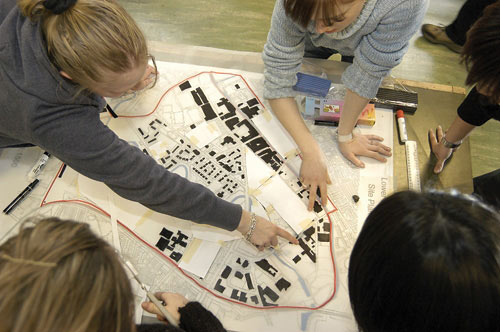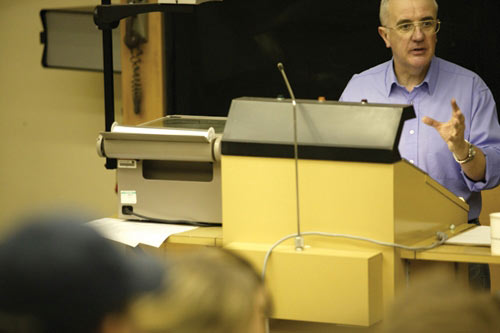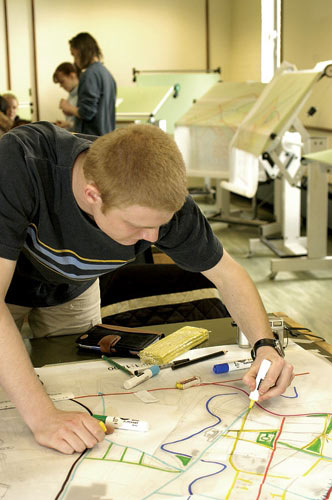A-level
Grades AAA. Mixture of science/maths and humanities/arts subjects preferred. Many candidates offer Art/Art related A levels - but it is not essential. Applicants often mix arts and science subjects such as Art, Maths and a language, but Maths, Physics and Chemistry is perfectly acceptable, as would be History, English and Religious Studies. However, candidates who combine, for example, Fine Art & Design and Technology for two of their three A Levels or who offer sports-science or similar put themselves at a disadvantage.
General Studies is welcomed but not normally included as part of the standard offer.
Two AS-levels will not be accepted in place of one A-level.
We do not require a pass in the Science Practical Assessment.
AS-level
We do not accept 2 AS levels in place of one A level.
Subjects welcomed but not normally included as part of the standard offer
General Studies is normally excluded from a standard offer.
Unit grade information
The University of Manchester welcomes the provision of unit grade information which, like all other available information, will inform the consideration of applications. Unit grades will not normally form part of offer conditions, except for Mathematics programmes.
GCSE
A good range of subjects at GCSE including English and Maths at Grade C (Grade 4 in the newly reformed GCSEs in England).
Applied GCSE Mathematics courses are not accepted.
Key Skills qualification
The University warmly welcomes applications from students studying the Key Skills qualification. However, as the opportunities to take these modules are not open to all applicants, currently this is not an essential requirement of the University.
International Baccalaureate
32 points overall. 6,6,6 at Higher Level.
English language
Students whose first language or language of instruction is not English will be asked to provide evidence of fluency in English by achieving scores in English Language Tests as follows: An overall score of 6.5 at IELTS, with 6.5 in writing and no other sub-section below 6.0; TOEFL iBT overall score of 90 with a minimum score of 22 in writing and 20 in the other sub-sections, Pearson PTE overall score of 59 with a minimum score of 59 in the written section and 51 in all other subsections, Cambridge CAE or Cambridge CPE grade C (Please note that the Cambridge First Certificate in English is not acceptable.)
English language test validity
Some English language test results are only valid for two years. Your English language test report must be valid on the start date of the course.
Irish Leaving Certificate
Grades A1, A1, A1, A1 at Highers. Other combination of grades will also be considered.
Scottish Highers
Grades A, A, A, A, A. Please see A Level entry requirements for subject specific requirements.
Scottish Advanced Highers
Grades A, A, A. Please see A Level entry requirements for subject specific requirements.
Welsh Baccalaureate
Grade A in the Welsh Baccalaureate core is acceptable in combination with 2 A Levels at grade A. Please see A Level entry requirements for subject specific requirements.
European Baccalaureate
Acceptable on its own or in combination with other qualifications. Applications from students studying for this qualification are welcome and all such applicants will be considered on an individual basis. Contact the University for further information.
Other international entry requirements
The University of Manchester has a rich academic heritage and is one of the world's leading research-intensive universities. It also has a long history of welcoming international students and seeks to continue this tradition by admitting excellent students from across the world. Details of country specific entry requirements are available from the University website .
BTEC Extended Diploma
BTEC Level 3 Extended Diploma in either Humanities or Science subjects with a minimum grade of Distinction, Distinction, Distinction. A BTEC Extended Diploma in Art & Design on its own will not be considered as meeting our entry requirements.
BTEC Level 3 Diploma with a minimum grade of Distinction Distinction plus grade A in one A levels.
BTEC Level 3 Subsidiary Diploma with a minimum grade of Distinction plus grade A in two A levels.
Please see A Level entry requirements for subject specific requirements.
Access to HE Diploma
Access to HE Diplomas in Humanities/Science subjects will be considered acceptable. Overall 60 credits are required with 45 at level 3. Minimum of 30 credits at Distinction and 30 credits at Merit. GCSE in English Language and Mathematics at Grade C or above are also required. Applicants will have to demonstrate their creative and visual awareness by the submission of a digital portfolio (via a blog) on request. We also consider other factors, such as other educational achievements, life experience and skills on an individual basis.
Cambridge Pre-U
Candidates taking Pre-U principal subjects in conjunction with A Levels are expected to achieve a combination of D3 in the Pre-U certificates and grade A at A level in three distinct subjects.
Advanced/Progression Diploma
Advanced Diplomas in Environmental & Land Studies; Construction & the Built Environment; Engineering will be considered acceptable, with an overall Grade B + A @ A Level (ASL). The A Level subject (ASL) can be any Arts/Humanities or Science A Level. If predictions for Advanced Diploma are satisfactory, applicants will be asked to submit a small sample of artwork - to assess creative ability and visual awareness. Applicants may, therefore, wish to consider an art & design A Level as their ASL; and if they do not have a formal qualification in art, we will accept self-motivated artwork.
Non-standard educational routes
UK based mature applicants will be asked to attend an interview as an additional supportive mechanism - as many candidates feel their applications contain gaps caused by less formal career paths; and their qualities are often revealed through face to face conversation. Applicants will be asked to bring their portfolios to the interview.
If you have followed a non-standard educational route and have been, for example, educated at home, your application will be considered against the standard entry criteria of the course to which you applied. You will be required to demonstrate that you meet the academic entry requirements as specified for the course. We will also require a reference which should be written by somebody who knows you well enough, in an official capacity, to write about you and your suitability for higher education. Please refer to UCAS for further information: UCAS reference guidelines
Other entry requirements
Because Architecture at Manchester is a design-oriented course most candidates will be asked to submit a portfolio. After an initial assessment of the UCAS application form, we will email suitable candidates to request a digital portfolio, via a blog with a deadline of approximately 4 weeks from receipt of the email. Applicants will be provided with a brief on how to create the digital portfolio and the required portfolio elements.
Return-to-learn students are those who have had a substantial period away from any formal learning. Often such learners have pursued careers or raised a family. The University understands that students come from many different backgrounds, with varying qualifications, careers and skills, but they often bring to their studies a high degree of motivation and experience.
The University recognises that standard selection measures and procedures may not enable these learners to demonstrate fully their suitability for their chosen course. Where appropriate, admissions officers will seek and consider alternative evidence in order to give such learners equivalent consideration. Where they deem this alternative evidence meets entry criteria fully the learner will not be required to meet the standard academic entry requirements.
























